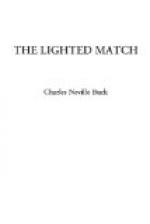For a time neither spoke, then Bristow went on.
“At the age of five, Cara stood before a mirror and critically surveyed herself. At the end of the scrutiny she turned away with a satisfied sigh. ‘I finks I’m lovely,’ she announced. At five one is frank. Her verdict has since then been duly and reliably confirmed by everyone who has known her—yet she might as well have been born into unbeautiful, hopeless slavery.”
Benton went to the window and stood moodily looking out. Finally he wheeled to demand: “How did the crown of Maritzburg come to your uncle?”
“When he married my aunt,” said Bristow, “he fancied himself safe-guarded from the ducal throne by two older brothers. That’s why he was able to choose his own wife. He was dedicated with passionate loyalty to his brushes and paint tubes. He saw before him achievement of that sort. Assassination claimed his father and brothers, and, facing the same peril, he took up the distasteful duties of government. My aunt’s life was intolerably shadowed by the terror of violence for him. She died at Cara’s birth and the child inherited all the protest and acceptance so paradoxically bequeathed by her heart-broken mother.”
“Realizing that Cara could not hope to escape a royal marriage, her father looked toward Galavia. There at least the strain was clean ... untouched by degeneracy and untainted with libertinism. Karyl is as decent a chap as yourself. He loves her, and though he knows she accepts him only from compulsion, he believes he can eventually win her love as well as her mere acquiescence. It’s all as final as the laws of the Medes and Persians.”
Again there was a long silence. Bristow began to wonder if it was, with his friend, the silence of despair and surrender. At last Benton lifted his face and his jaw was set unyieldingly.
“Personally,” he commented quietly, “I have decided otherwise.”
* * * * *
Despite the raw edge on the air, the hardier guests at “Idle Times” still clung to those outdoor sports which properly belonged to the summer. That afternoon a canoeing expedition was made up river to explore a cave which tradition had endowed with some legendary tale of pioneer days and Indian warfare.
Pagratide, having organized the expedition with that object in view, had made use of his prior knowledge to enlist Cara for the crew of his canoe, but Benton, covering a point that Pagratide had overlooked, pointed out that an engagement to go up the river in a canoe is entirely distinct from an engagement to come down the river in a canoe. He cited so many excellent authorities in support of his contention that the matter was decided in his favor for the return trip, and Mrs. Porter-Woodleigh, all unconscious that her escort was a Crown Prince, found in him an introspective and altogether uninteresting young man.
Benton and the girl in one canoe, were soon a quarter of a mile in advance of the others, and lifting their paddles from the water they floated with the slow current. The singing voices of the party behind them came softly adrift along the water. All of the singers were young and the songs had to do with sentiment.




